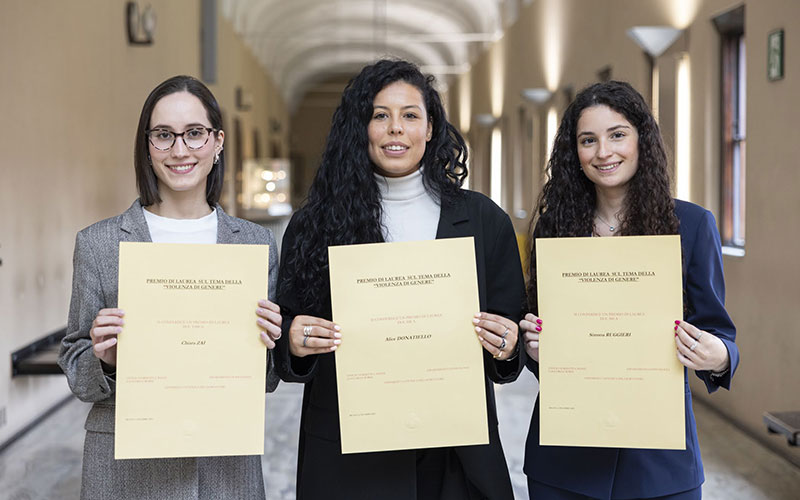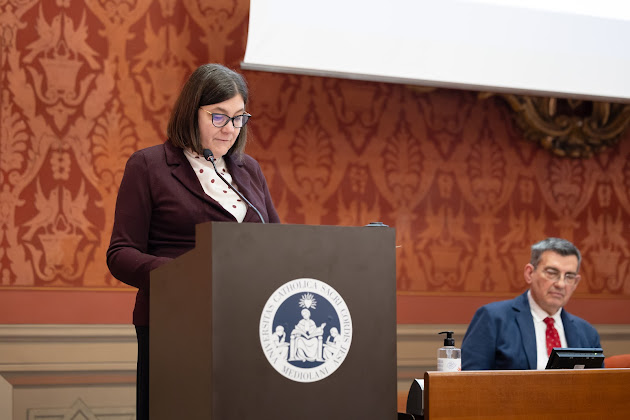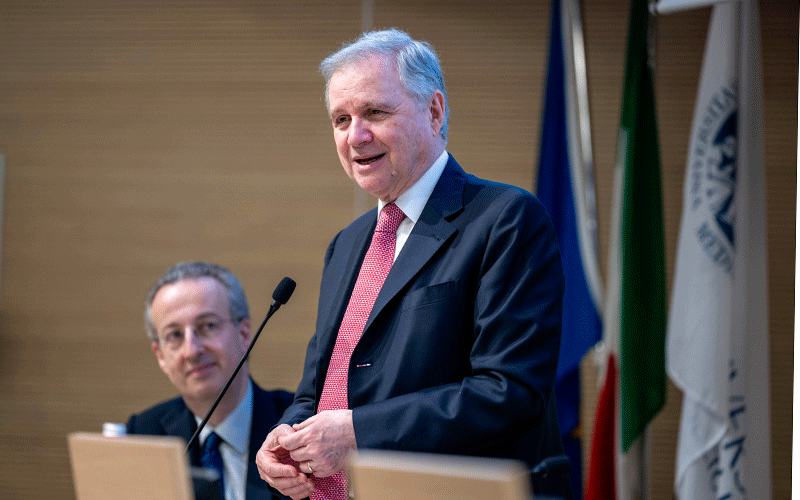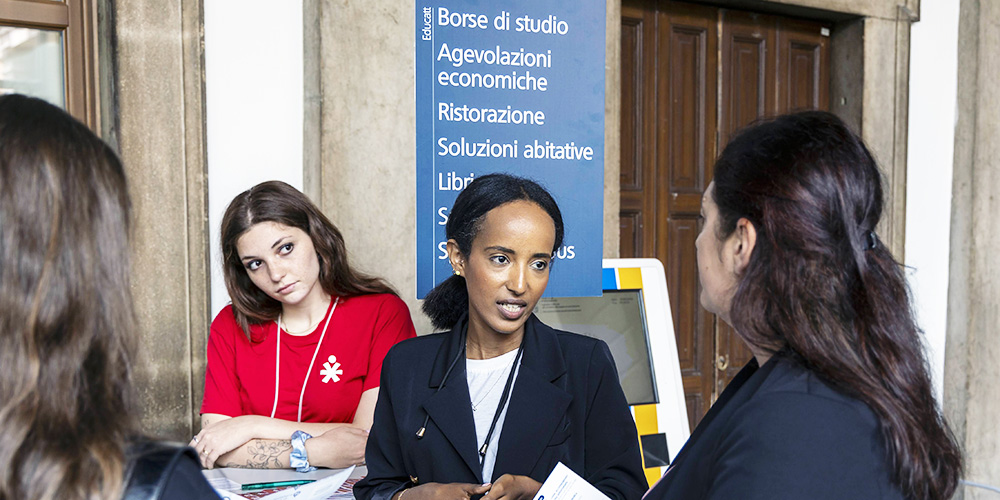.png) Orientamento
Open day Lauree triennali, a ciclo unico e magistrali #Unicatt
Dal 28 marzo al 10 maggio: save the date! Scopri le date nei Campus
Orientamento
Open day Lauree triennali, a ciclo unico e magistrali #Unicatt
Dal 28 marzo al 10 maggio: save the date! Scopri le date nei Campus
Scegli il tuo percorso
In evidenza
Eventi
85 elementi trovati
-
Ciclo di lezioni I Giubilei nella storia
Milano - 29 aprile 2025 -
Workshop interdisciplinare Signore degli eserciti
Milano - 29 aprile 2025 -
Conferenza Matematica Pop
Brescia - 29 aprile 2025 -
Stage & Placement Start-up e Sostenibilità per il Futuro: come innovano le aziende di grandi dimensioni? Un viaggio nel mondo KME
Piacenza - 29 aprile 2025 -
Incontro Magnifico, ricco e mirabile. Letture dell’«Orlando furioso»
Brescia - 29 aprile 2025 -
Lezione aperta Il vocabolario storico della lingua italiana della gastronomia (VoSLIG)
Milano - 29 aprile 2025 -
Lezione Il trattamento dei dati personali nello Stato della Città del Vaticano
Piacenza - 29 aprile 2025 -
Workshop Fiscalità e calcio professionistico
Piacenza - 29 aprile 2025 -
Seminario Deleuze. Stili della filosofia
Milano - 29 aprile 2025 -
Lecture The long journey to Inside Out and Inside Out 2
Milano - 29 aprile 2025 -
Lezione aperta L’anno del Grande ritorno e del Grande perdono. Il Giubileo del 1950
Brescia - 30 aprile 2025 -
Stage & Placement CV LAB | Imposta il format più adeguato al tuo contesto professionale
Cremona - 30 aprile 2025 -
Lezione aperta Incontri formativi e di orientamento sulla tesi di laurea
Brescia - 30 aprile 2025 -
Incontro L’Orestea nella tragedia romana: dall’ Agamennone di Eschilo all’Agamennone di Seneca
Milano - 30 aprile 2025 -
Workshop Introductory lecture on European VAT: history, current trends and future perspectives
Piacenza - 30 aprile 2025 -
Lezione aperta Ho detto segni, non sogni
Milano - 30 aprile 2025 -
Ciclo di Seminari La Chiesa “esperta in umanità”
Milano - 02 maggio 2025 -
Talks La storia di Guido RAVENNA, CEO Montebello Advisory
Piacenza - 05 maggio 2025 -
Scientific Colloquium The Hope for a Nourished Planet: which agenda for Catholic Universities?
Cremona - Dal 05 maggio 2025 al 06 maggio 2025 -
Ciclo di lezioni I Giubilei nella storia
Milano - 05 maggio 2025 -
PhD Course Non linear dynamics in economics and physics
Brescia - Dal 05 maggio 2025 al 08 maggio 2025 -
Company Visit BONELLIEREDE
Milano - 05 maggio 2025 -
Lezione aperta Anno 1300: il Giubileo di Bonifacio VIII e gli artisti
Brescia - 06 maggio 2025 -
Lezione aperta Il Giubileo del 2000
Brescia - 06 maggio 2025 -
Evento Mettiti nei miei panni
Milano - Dal 06 maggio 2025 al 07 maggio 2025 -
Ciclo di lezioni I Giubilei nella storia
Milano - 06 maggio 2025 -
Proiezione film Film and Media Screenings
Milano - 06 maggio 2025 -
Stage & Placement BOBST, oltre 130 anni di tradizione e innovazione: soluzioni per un packaging sostenibile
Piacenza - 06 maggio 2025 -
Lezione aperta L'uso dei documenti epigrafici nella Periegesi di Pausania
Brescia - 06 maggio 2025 -
Lezione aperta Incontri formativi e di orientamento sulla tesi di laurea
Brescia - 06 maggio 2025 -
Lezione aperta Conversione religiosa e duello cavalleresco: autobiografia epica romanzo
Brescia - 06 maggio 2025 -
Convegno Rileggere Chabod, direttore della «Rivista storica italiana» (1948-1960)
Brescia - Dal 06 maggio 2025 al 07 maggio 2025 -
Presentazione volume “È tutta Italia la Patria mia”. Libri scolastici e altre testimonianze di scuola (1860-1960)
Brescia - 06 maggio 2025 -
Convegno Sperare l’insperabile (ER. 18): economisti e giuristi in dialogo
Piacenza - 06 maggio 2025 -
Lezione aperta Impronta antisemita. Pensieri e strumenti per riflettere sulla questione ebraica
Brescia - 06 maggio 2025 -
Seminario Costruire la salvezza
Brescia - 07 maggio 2025 -
Workshop interdisciplinare Signore degli eserciti
Milano - 07 maggio 2025 -
Stage & Placement IL COLLOQUIO DI GRUPPO ricreato attraverso la metodologia dell’ASSESSMENT CENTER.
Cremona - 07 maggio 2025 -
Lezione aperta Natura e dinamiche del potere
Brescia - 07 maggio 2025 -
Seminario Seminario permanente per la Storia della sanità cattolica: perché?
Brescia - 07 maggio 2025 -
Lezione aperta I rapporti pubblico-privati nel sistema di accoglienza dei migranti umanitari
Brescia - 08 maggio 2025 -
Il Pianoforte in Ateneo Il Pianoforte in Ateneo
Milano - 08 maggio 2025 -
Stage & Placement Students give a presentation in pairs or alone. Discussion and Feedback
Piacenza - 08 maggio 2025 -
Ciclo di Seminari La Traduzione Letteraria
Milano - 08 maggio 2025 -
Stage & Placement RICERCA & SVILUPPO
Piacenza - 08 maggio 2025 -
Lezione aperta La realtà educativa di VER
Brescia - 08 maggio 2025 -
Lezione aperta Attualità di Ermanno Olmi
Brescia - 08 maggio 2025 -
FIVERS Meets Students
Milano - 08 maggio 2025 -
Stage & Placement Game: la legalità e l’etica del lavoro. Gioco a squadre predisposto dal Consiglio Nazionale dell’Ordine Consulenti del lavoro.
Piacenza - 08 maggio 2025 -
STAGE&PLACEMENT Cv Point – Gi Group
Milano - 08 maggio 2025 -
Stage & Placement THE GROUP INTERVIEW recreated through the ASSESSMENT CENTER methodology. Case study with focus on analysis and resolution of a work situation.
Piacenza - 09 maggio 2025 -
Lezione aperta Lavorare scrivendo
Milano - 09 maggio 2025 -
Lezione aperta Retorica, poetica e critica letteraria nell’Italia del Seicento
Brescia - 09 maggio 2025 -
Seminario Exploring new technologies (chat gpt) for foreign languages, linguistics and literature
Milano - 09 maggio 2025 -
Stage & Placement Dinner Meeting con…
Piacenza - 09 maggio 2025 -
Convegno di studi La Chiesa al servizio della società
Piacenza - 09 maggio 2025 -
Convegno I 70 anni del Collegio Sant’Isidoro
Piacenza - 10 maggio 2025 -
Graduation Ceremony Festa di Laurea 2025
Cremona - 10 maggio 2025 -
Ciclo di Seminari La Chiesa “esperta in umanità”
Milano - 12 maggio 2025 -
PhD Course Statistical Methods for Physical and Biomedical Sciences
Brescia - Dal 12 maggio 2025 al 27 maggio 2025 -
Company Visit - Generali
Torre Generali di Piazza Tre Torri 1, Milano - 12 maggio 2025 -
Incontro Comunicare la speranza
Brescia - 12 maggio 2025 -
Evento Mettiti nei miei panni
Brescia - 13 maggio 2025 -
Lezione aperta Incontri formativi e di orientamento sulla tesi di laurea
Brescia - 13 maggio 2025 -
Incontro Futuramente Festival
Milano - 13 maggio 2025 -
STAGE&PLACEMENT Job Target - Lavoropiù Spa
Milano - 13 maggio 2025 -
Workshop interdisciplinare Signore degli eserciti
Milano - 14 maggio 2025 -
Incontro con l'autore Daniele Mencarelli
Milano - 14 maggio 2025 -
Career Event Talent Day 2025
Milano - 14 maggio 2025 -
Orientamento alle lauree triennali e a ciclo unico Incontro di preparazione al TIEC: Test di Ingresso a Economia in Cattolica
Online, su Webex - 14 maggio 2025 -
Evento Workshop Prova l'orchestra e Concerto degli studenti
Milano - 15 maggio 2025 -
Incontro NEWS 4 HOPE
Brescia - 15 maggio 2025 -
Ciclo di seminari a.a. 2024/2025 FORmazione MEtodologica (FORME)
Milano - 16 maggio 2025 -
Graduation Ceremony Festa di Laurea 2025
Piacenza - 17 maggio 2025 -
Convegno Il Leone e la Vipera: le arti a Brescia nel Trecento
Brescia - Dal 22 maggio 2025 al 23 maggio 2025 -
Seminario internazionale Conoscenza profetica e libertà umana tra medioevo e rinascimento
Milano - 23 maggio 2025 -
Convegno FIT FOR 55: il ruolo della tassazione energetica nella strategia europea per ridurre le emissioni di gas serra
Cremona - 29 maggio 2025 -
Seminario Il diritto di contare
Brescia - 04 giugno 2025 -
Il Pianoforte in Ateneo Il Pianoforte in Ateneo
Milano - 05 giugno 2025 -
Ciclo di seminari a.a. 2024/2025 FORmazione MEtodologica (FORME)
Milano - 12 giugno 2025 -
Ciclo di seminari a.a. 2024/2025 FORmazione MEtodologica (FORME)
Milano - 19 settembre 2025 -
Il Pianoforte in Ateneo Il Pianoforte in Ateneo
Milano - 25 settembre 2025 -
Ciclo di seminari a.a. 2024/2025 FORmazione MEtodologica (FORME)
Milano - 09 ottobre 2025 -
Il Pianoforte in Ateneo Il Pianoforte in Ateneo
Milano - 16 ottobre 2025 -
Il Pianoforte in Ateneo Il Pianoforte in Ateneo
Milano - 13 novembre 2025
Succede in ateneo

Psicologia
Violenza di genere, un “affare” pubblico Tre tesi di laurea magistrale della Facoltà di Psicologia premiate nel campus milanese e il coinvolgimento di tutto l’Ateneo che continua a riflettere, approfondire e interrogarsi su un tema che riguarda le donne e sempre più le nuove generazioni Info
Brescia
Un nuovo patto tra scienza e società Per gettare semi di speranza, va rialimentato il circuito di fiducia verso la ricerca scientifica, il rettore Elena Beccalli annuncia la pubblicazione di un libro bianco sull’università come luogo di speranza
Piacenza
Non solo dazi. Ignazio Visco fotografa il mondo che cambia Una lezione sulla complessità della situazione attuale, oltre gli atteggiamenti estemporanei dell’amministrazione americana, la strutturale difficoltà della governance europea di elaborare posizioni unitarie e l’incertezza sulla solidità della CinaLetteratura
Vargas Llosa: le storie moltiplicano la vita Il celebre autore peruviano, Nobel per Letteratura nel 2010, scomparso lunedì 14 aprile, nel 2018, in un'Aula Magna gremita, tenne una lectio magistralis nel nostro Ateneo. Il racconto di quell'incontro nelle parole del prof. Giuseppe LupoRoma
Met for Planet, l’Università Cattolica al Villaggio per la Terra Dal 10 al 13 aprile a Roma oltre 170 studenti dell’Ateneo animano i luoghi della manifestazione dedicata alla salvaguardia del Pianeta con progetti e proposte su salute, economia e ambienteMilano
Salviamo il mare e il pianeta dalla plastica Inaugurata al Museo civico di Storia naturale di Milano alla presenza di Susan Sarandon l’opera dell’artista Fabrizio Ferri “Breathtaking”. Visitabile dal 2 al 27 aprile, la mostra è un monito alla responsabilità individuale nel rispetto dell’ambienteMilano
Come funziona il Consiglio d'Europa Mons. Marco Ganci, Osservatore permanente per la Santa Sede, ospite del ciclo di seminari del corso di Storia e sistemi dei rapporti tra Stato e Chiesa: «La difesa della dignità dell’uomo è il centro di ogni azione della Santa Sede»
intelligenza artificiale, sociologia
Humane Metaverse: il futuro oltre l’hype Andrea Gaggioli, Daniela Villani
demografia, lavoro
Italia 2050 Che paese sarà l’Italia nel 2050? È possibile oggi capire che strada prendere per governare i cambiamenti in atto? Per governare l'incertezza del futuro bisogna evitare di semplificare problemi complessi. Dobbiamo pensare a lungo termine, considerare tutte le variabili in gioco e creare una rete globale di conoscenza. A cura di Marzio Mian e Nicola Scevola 5 episodi
inclusione
Tutti inclusi Un viaggio tra le voci dell’Università per esplorare gli effetti dell’intelligenza artificiale nella nostra vita. Perchè i robot sono già qui con noi. O forse contro di noi. Alleati dell’uomo o nemici dell’umanità? Massima espressione di intelligenza oppure d’incoscienza? 5 episodi
migranti
Sconfinati L’onda dei profughi in fuga dalla guerra in Ucraina sconvolge l’Europa e impone di aggiornare il dibattito sugli esodi e l’accoglienza, fenomeni che da decenni dividono le coscienze e la politica del Vecchio Continente. Le voci-guida sono quelle degli esperti dell'Ateneo, integrate da testimonianze nazionali e internazionali di primo piano. Una serie podcast in cinque puntate dell'Università Cattolica a cura Marzio Mian e Nicola Scevola, pubblicata su Avvenire 5 episodi
migranti, politica estera
2025, andata o ritorno Una serie di Avvenire realizzata in collaborazione con l’Università Cattolica, che trae spunto dai grandi temi emersi alla Settimana sociale dei Cattolici italiani di Trieste. Cinque puntate per cinque dimensioni chiave di un anno, il prossimo, che si preannuncia come un sottile e delicato crinale. 5 episodi
media
Io sono la radio Una serie a cura degli studenti del Master Fare Radio dell'Università Cattolica del Sacro Cuore 5 episodi
letteratura, pedagogia
Ritratti di un tempo Ci sono personaggi che segnano un’epoca. Alcuni di fama indiscussa sono diventati miti o “leggende”, altri meno noti alle grandi platee sono riconosciuti perché hanno contribuito a una scoperta scientifica, hanno vinto un Premio Nobel, o hanno avuto una vita spiritualmente esemplare, o sono diventati un’icona del loro tempo in campo letterario, artistico, musicale. Attraverso queste donne e questi uomini, prende forma di volta in volta un periodo storico, una generazione, una cultura. Affidiamo questi ritratti ai docenti dell’Università Cattolica del Sacro Cuore per ascoltare racconti, aneddoti, interpretazioni e lasciarsi trasportare da provocazioni e suggestioni. 11 episodi
sociologia
Padri e Madri della Sociologia Racconti, aneddoti e storie di chi ha formato le idee sulla società. Li raccontano in questa serie podcast le autrici e gli autori che hanno contribuito alla stesura del manuale di Sociologia generale (Vita e Pensiero, 2022) curato da Rita Bichi 7 episodi




















